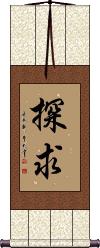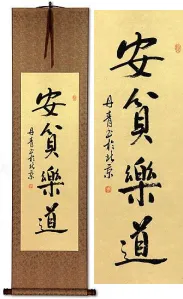Many custom options...
And formats...

Not what you want?
Try other similar-meaning words, fewer words, or just one word.
Feel free to email me with your request. If it's easy, I'll translate it for free and add it to this database of calligraphy for you.
Seek Quest in Chinese / Japanese...
Buy a Seek Quest calligraphy wall scroll here!
Seek / Quest
探求 means: to seek; to pursue; to investigate; quest; pursuit.
探求 has the same meaning in Chinese, Japanese Kanji, and old Korean Hanja.
This in-stock artwork might be what you are looking for, and ships right away...
Gallery Price: $100.00
Your Price: $49.88
Not the results for Seek Quest that you were looking for?
Below are some entries from our dictionary that may match your Seek Quest search...
| Characters If shown, 2nd row is Simp. Chinese |
Pronunciation Romanization |
Simple Dictionary Definition |
探求 see styles |
tàn qiú tan4 qiu2 t`an ch`iu tan chiu tankyuu / tankyu たんきゅう |
More info & calligraphy: Seek / Quest(noun, transitive verb) search; quest; pursuit |
求索 see styles |
qiú suǒ qiu2 suo3 ch`iu so chiu so gusaku |
to search for something; to seek; to quest; to explore to seek out |
The following table may be helpful for those studying Chinese or Japanese...
| Title | Characters | Romaji (Romanized Japanese) | Various forms of Romanized Chinese | |
| Seek Quest | 探求 | tankyuu / tankyu | tàn qiú / tan4 qiu2 / tan qiu / tanqiu | t`an ch`iu / tanchiu / tan chiu |
Successful Chinese Character and Japanese Kanji calligraphy searches within the last few hours...





